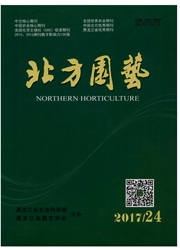

 中文摘要:
中文摘要:
以“中蔬4号”番茄为试材,采用营养液栽培法,研究了不同浓度外源硒(Se)对75mmol·L-1 Ca(NO3)2胁迫下番茄幼苗生长、根系活力、叶绿素含量、丙二醛(MDA)以及超氧化物歧化酶(SOD)、过氧化物酶(POD)、过氧化氢酶(CAT)活性的影响。结果表明:施用0.010mmol·L-1的外源硒通过提高Ca(NO3)2胁迫下番茄叶片根系活力、光合色素含量和活性氧清除能力、降低膜脂过氧化,保护膜结构的完整性,从而有效缓解了Ca(NO3)2胁迫对番茄幼苗生长的抑制和伤害;0.200mmol·L-1的高浓度硒处理显著降低了Ca(NO3)2胁迫下番茄叶片根系活力、光合色素含量,从而加剧了Ca(NO3)2胁迫对番茄幼苗生长的抑制,而过高的外源硒浓度(0.500mmol·L-1)则直接导致了番茄幼苗植株的死亡。
 英文摘要:
英文摘要:
Tomato variety of‘Zhongshu No.4'was used as test material,a hydroponic experiment was conducted to investigate the effects of exogenous selenium(Se)on the plant growth,root activity,as well as chlorophyll content,malonaldehyde(MDA)and SOD,POD,CAT activity in leaves of tomato seedlings under Ca(NO3)2 stress.The results showed that,the application of 0.010 mmol·L-1 exogenous Se significantly alleviated Ca(NO3)2-induced growth inhibitation by increasing root activity,photosynthetic pigment content and the defense ability of antioxidant enzymes system to decrease membrane lipid peroxidation and protect the integrity of membrane structure in tomato seedlings under Ca(NO3)2 stress.The application of 0.200mmol·L-1 exogenous Se significantly lowers root activity and pigment content under Ca(NO3)2 strress and thus intensified the inhabitation of Ca(NO3)2 stress to tomato seedlings.But the application of 0.500mmol·L-1 exogenous Se maight directly lead to the death of tomato seedlings.
 同期刊论文项目
同期刊论文项目
 同项目期刊论文
同项目期刊论文
 期刊信息
期刊信息
